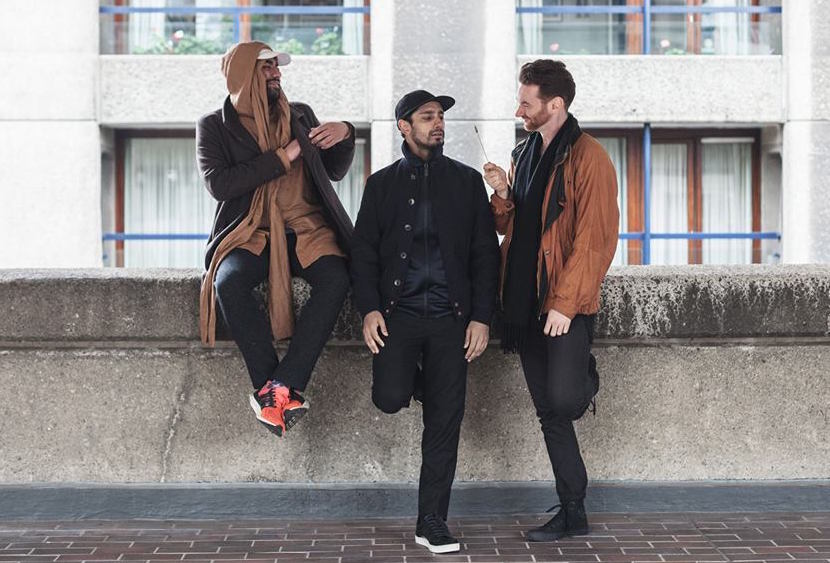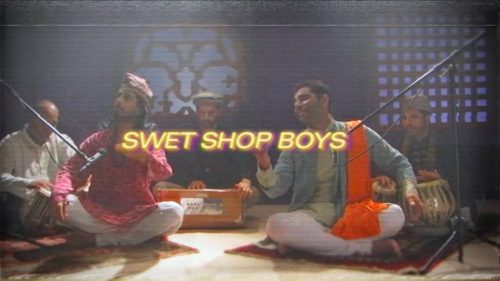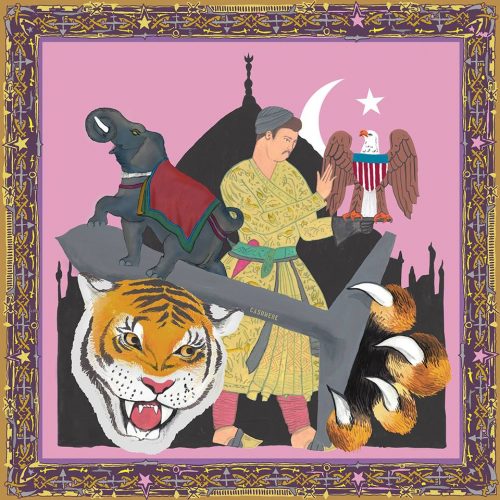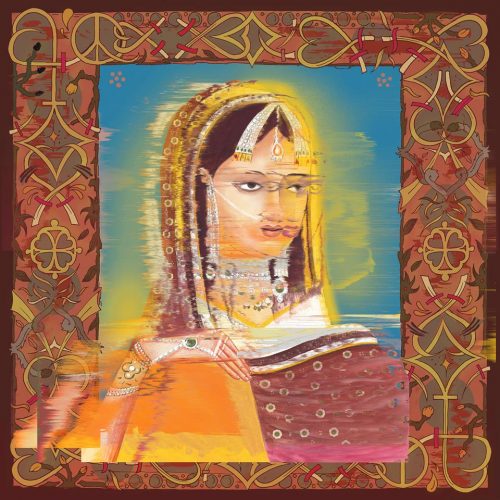
by Suraiya Ali – Follow @iranikanjari
I want to make very clear that the first time I heard the work of Riz MC, Redhino, and Heems, aka the Swet Shop Boys, I was moved. I was incredibly moved.
I am a girl who has the difference between a Muhjra Song and a Qawali down to a science. I am a girl who was forced to memorize the analytical difference between not only Aziz Mian and Nusrat Fateh Ali Khan but Drake while he rapped for YMCMB and Drake while he rapped under OVO. I take music seriously. As a Sufi is it my main connection with Divinity. It was handed to me as a gift- and when I first heard Cashmere- I was utterly reduced in supplication to how divine every song was.
[Read Related: Swet Shop Boys’ ‘Cashmere’ and the Representation We Need]
Like many who come from Arab, Persian and South Asian spheres of influence, the music of Swet Shop Boys feels like the only music we’ve ever heard that belong to us fully. It is not the music of our parents, it is not the music of our other allies of color. It is ours. It attempts to undo every time one of us has walked into a bookstore, record shop, or art show and felt the desperation zero representation.
Their music is a testament to the fact that we, as “easterners,” do not have to exist in the ambiguous genre of “world music” or the grossly reductive literary corpus of “mythology.” It is representation.
That is the music. Then there are the men who make it. Recently, before their Los Angeles concert in their Sufi La tour, Heems and Riz came down to the University of Southern California to do a talk on Politics, Art, and Activism. Brown Girl Magazine was lucky enough to not only attend the talk but also get a few questions answer by Heems, before of course, attending their concert at Echoplex two nights later. Through this serious immersion into Swet Shop Boys, there was the feeling of both deep love and deep critique. As we discuss in this article what the boys discussed with us, It becomes apparent that while we love Swet Shop Boys it’s important to remain critical of the artist while we remain loyal to the music.
Politics, Art, and Activism at USC
Riz and Heems were interviewed by astounding author and academic, Dr. Sohail Daulatzai. Although several questions were asked, the boys ended up speaking candidly about the diversity of brownness, cultural heritage and how these things work in tandem to effect activism.
British Colonialism and Brownness
When it comes to speaking on national upbringing, Riz and Heems have somewhat separate experiences. The relationship between brownness and the colonialism is one that Riz has found to be both inspiring and anxiety inducing. He spoke on how he inherited both the “spoils and the scars of the [British Empire.]” This relationship coming from both a of space gratitude- as his family was able to move to the UK and benefit from certain institutions i.e. the spoils- as well as a place of degradation- that regardless of how much he benefited from a modern western society, he was still othered within it, and still ended up feeling the sadness of Pakistan’s colonial history i.e. the scars.
Dealing with these dual forces caused him a confusion of lineage, one that many first gen’s feel. He synthesized this cognitive dissonance in humor, remarking “I’m left looking at the UK and wondering ‘wait, are you my dad?’” A lot of us don’t feel like we belong anywhere, but at least we can tell a few jokes to ease the dissonance.
Media and Brownness
As both Heems and Riz are entertainers and have been entertainers for some time now. Through indie British films or Das Racist- both men have seen the landscape of entertainment change as the political appeal and political disdain of brownness has ebbed and flowed. Riz points out that “brownness is [often] absent from the conversation” in entertainment and activism. If it does surface, it “comes from Islamaphobia or the refugee crisis.” This leads to a dangerous binary- “You’re film stars and terrorists,” a middle ground is absent, and when such nuance isn’t allowed to exist it becomes “destabilizing and shocking” to the entertainment industry every time a brown person tries to take up any kind of space outside of type casting.
This continual and destructive “injection of brownness” is why, as Riz explains, “we [as brown people] can’t exist on a spectrum- [our] story gets written by other people,” meaning until this destabilizing injection ceases, and a more normalized view of the south Asian, Arab, or Persian individual is allowed to be cultivated- the very existence of brown people in entertainment will constitute as activism. In many ways, the binary of film star or terrorist does help create a merging of activism and entertainment: our attempts to break out of marginalization in one field will spill over into our politics. Sometimes bad things can have good consequences.
First Generation Experiences and Brownness
It can be very hard to conceptualize the first generation struggle into one word, Riz took this challenge in stride and has repeatedly chosen the word “Mongrel” and Mongrelism” to explain his experiences. The dictionary definition of such is defined my Merriam-Webster to be “an individual resulting from the interbreeding of diverse breeds or strains; especially one of unknown ancestry.” Which is rather fitting: many of us are forced to find ways to blend aspects of east and west in both exercises of survival and exercise of artistic expression. Going back to Riz questioning if the UK is his dad, the idea of being a mongrel latches on to the ambiguity of not fitting into the home of your parents while not fitting into the stereotypical role of a westerner. Where do we really come from? Can we claim both the global north and the global south as our homes? does such fluidity in culture exist? Riz eloquently stated that in order for such a fluid identity to exist “culture must persevere but on [our] own terms.” Riz defined these terms through a metaphor- which I’ll do my best to paraphrase, as I’m no Oxford graduate.
“Your culture is like a vase, an antique handed to you by the people who came before you. You have a choice of what to do with this vase. Some people see it and tuck it away in their attic, it collects dust, it isn’t a part of their lives. Some people understand it’s importance, but aren’t aware of how to use it; they put it on their mantle, and stare at it daily. To them, it is a relic. There are some people, however, who see this vase, and say “I’m going to use this.”
They integrated it into their lives, they drink water out of it. They embrace its utilitarian purpose. Your culture is a vase and what are you going do with it? We don’t really know what. I don’t really know what to do with it. I’m still figuring it out, but SSB is its own kind of pottery, and through this music were trying to figure it out.”
A Talk with Himanshu Suri
Many of us were plugged into the creative force of Himanshu Suri aka Heems in the late 2000’s with the birth of Das Racist. A native of Queen’s, he spoke at USC that there he was able to experience a globe’s worth of cultures right within walking distance of his childhood home. “The two airports in New York are in Queens,” he said jokingly, “the cultures that exist in the area are all similar in their diversity, it’s the airplanes that are the weird part.” You don’t have to leave Queens to find the culture. And you don’t have to chase Heems to NYC to get a word with him, BG was lucky to grab his two sense right here in LA.
BG: Conversations with you and Riz often center around brownness and what that means on a global level, yet your experience is incredibly American and then on top of that, you’re a proud New Yorker. What does American Brownness mean to you? What are the privileges and disadvantages of not having the long colonial history of the Old World?
Heems: “I wouldn’t say my experience is incredibly American. “Incredibly American” to me evokes more Ford Trucks, apple pies, and baseball than I’ve seen in my life. My experience has been incredibly New York which I think has its own set of connotations that are far more diverse. I’m connected to that same, long, colonial history of the Old World whether through my being American or my being of Indian descent. To be honest this project was about learning those differences to break them down and it’s been effective in that I don’t think about things in these terms anymore – American, Indian, Pakistani, British. They all flow in and out of each other to me these days.”
BG: At the USC talk you mentioned that if our “oppressors” put up the physical borders between us, we shouldn’t go around and put up emotional or cultural walls. How do you reconcile the need for both distinct spaces for brown folk along with knowing there also needs to be a convergence between different people? Do you think your upbringing in Queens helped you understand the nuances of cultural convergence?
H: “My comment was more on our oppressors lumping us into one category whether Hindu, Muslim, and Sikh and how rather than reinforcing that mentality using it to strengthen bonds and fight oppression together. Instead of standing up and saying “I’m not Muslim”, to say what if I do identify with parts of Islam. I think Swet Shop Boys in many ways is about breaking down the walls between Hindu, Muslim, and Sikh many of our parents carried over with them from South Asia. That’s a lot of weight to carry around the world.”
BG: Talking about India, you pointed out the concept of fossilization- the India you now know is not the one your parents did, as they are now 20 or so years removed from the nation’s fast growth. You’ve seen the nation boom as you’ve grown up. How does that affect the relationship you have with your parents? Your culture? Your understanding of your nation’s history?
H: “Fossilization to me is more about my parents carrying that older India with them to New York and raising me with that set of understanding. Often I think about this in terms of communalism from U.P. being carried to New York. For me, in a way, traveling to India on a regular basis the past 5 years has been about un-fossilizing that way of thinking. Although, a lot of the conversation isn’t just about where you are but what class you’re a part of. While my folks watch a lot of satellite TV and understand that India has changed culturally, to them it’s only the rich people who have become more Western. And while my family in India and my parents in New York have seen financial growth, as middle-class Indians their beliefs are the same as they were 30+ years ago. So much of the focus of raising children in the diaspora has been growing financially while culturally remaining rooted in the past.”
BG: Brown kids aren’t usually allowed to dream big, and if they do, dreaming big as artists are even more taboo. You’ve accomplished a lot of your wildest dreams I’m sure- but what else is there? What’s that really crazy big dream or idea that you don’t even mention to people because on so many levels it’s f*cking insane?
H: “I still often feel like I shouldn’t dream big. Although if I want to do something I have no qualms mentioning it and then trying to achieve it. In the next ten years, I’d like to work on a novel and a restaurant. Then eventually I’d like to be some kind of spiritual guru figure who capitalizes on the spiritual insecurities of white people.”
April 20th, Live at Echoplex
To be completely honest, this concert was my first concert. I got there early, got right to the front, and screamed the entire time. It was, in many ways, life altering. The two are fantastic performers, their energy is invigorating, to say the least. The 4/20 crowd was, in all senses of the word, high on life. New music from the Sufi La EP debuted along with favorites from Cashmere. The crowd was also treated to a spoken word piece by Riz which very eloquently showcased both his leftism and his militancy towards oppression. It all seemed perfect — a 4/20 night in the illustrious Los Angeles with your favorite South Asian rappers, hot boxing a venue to their hatred of capitalist oppression and qawwali hip hop beats, two days after a conversation on the intersections of brownness. It sounds as good as a joint feels.
The gag is, the very dissonance The Swet Shop Boys speak on breaking, they also seem to create. The day of the USC talk Riz posted a picture of him with the less than popular Lena Dunham. The comments of the photo ranged from disgust to disappointment — as Lena has not only been hailed a white feminist, but also a rapist and an emotional abuser. Many would argue affiliation with her proves show-boat tendencies. At the USC talk, a black Muslim woman boldly went up to Heems and asked if he was ready to own up to the fact that he very openly used to use the N-word and tried to defend his right to do so. Of course, he apologized and regretted those decisions that very moment, but that doesn’t mean we erase the fact that it happened.
The Swet Shop Boys said at the talk and convey through their music a hate for the systems that oppress them, yet they make decisions that fit into patterns of disenfranchisement. Especially when it comes to their own fame. Riz, who has actively crafted lyrics about brown girls “being sweet as baklava” and makes music video content trying to normalize the concepts of young brown love, takes roles, such as those in “Girls,” that exoticize him to fit into romantic relationships with white women. Understandably, HBO is a huge break, but where does his politics actually stand? That’s not to say brown people should only date brown people in fiction or in reality — but such decisions affect how the rest of us will navigate not only the entertainment industry but any industry we enter.
Do we discount our politics and creative expression for the chance of more representation? Does that not uphold stereotypes and disparage us further? Riz’s music and his acting work don’t always seem to reconcile. The same goes for Heems, while “I’m getting paid to lecture at uni’s that turned me down” basically explains the reason to come to the University of Southern California, one of the most expensive private schools in the nation. That choice doesn’t compute with their repeated message of toppling the “isms” that create hardships for black and brown people: as participating in and thriving in capitalism, and coming to a school like USC, which upholds very intense standards of whiteness, does the exact opposite of that.
It’s impractical to demand they remain underground and relatively poor to keep their music politically correct. But understandably, as a fan base, as a brown woman, seeing your role models pander to the very thing phasing you out of art galleries and record shops is confusing- just as confusing as trying to figure out if the UK or Pakistan is your cultural dad. How do we as a fan base react to music and spoken word about creating an inclusive world when the group that we look up to takes roles that Orientalize them and do gigs at institutions that work to the exploitation of people with their skin color? I don’t really have an answer. I really just wanted to call attention to the question. It will probably come up again and again as more of us start to reach new heights in entertainment.
Their fame does allow for levels of normalization- as stated at the beginning of this discussion, their music is us. The relationship between representation and disenfranchisement, however, is a dance over a very very fine line. Striking the perfect chord, no pun intended, is going to be a serious challenge for our generation’s brown artist and entertainer.
The Sufi La EP was released just last month as a digital copy; the music has already been played, either on the white vinyl released in April or on the very tour that sparked this discussion. As a child of a mystic lineage, asking questions is part of connecting to divinity. The Swet Shop Boys’ rappers have shown a love for Rumi, a trailblazing name in normalizing Sufism in the West. As their next work is titled Sufi La, and from now on they will not only be under the critique of the white man but also their brown fans. The Rumi quote “Do not look at my outward shape, But take what is in my hands” becomes very fitting. We must remember to remain critical of the creators while remaining supportive of their craft i.e. what is in their hands.
Heems and Riz MC are in many ways defining the very landscape of south Asians, Arabs, and Persians in entertainment and politics. Along with Jobrani, Minaj, and Kaling, their names will go down as trailblazers. We must question these names. We must be responsible fans. If we want to help them blaze a trail of inclusivity- where “brown boy” and “boy” mean one in the same, it starts by not putting these two men on a pedestal. It starts by letting them be nuanced. It starts by asking hard questions about their work, and harder questions about their politics. We are all fans, but we are not gullible fans- and judging by the music of these two mystics- they wouldn’t want us as to be anything but critical.
[Photos: Swet Shop Boys/Facebook, Videos: Suraiya Ali & Keertana Sastry]
 Suraiya Ali is a student currently living in Dallas, Texas. Her interests include feminist theology, mystic poetry, and the pursuit of the perfect matte lipstick. She wants to eventually couple a business degree with one in linguistics and theology.
Suraiya Ali is a student currently living in Dallas, Texas. Her interests include feminist theology, mystic poetry, and the pursuit of the perfect matte lipstick. She wants to eventually couple a business degree with one in linguistics and theology.







